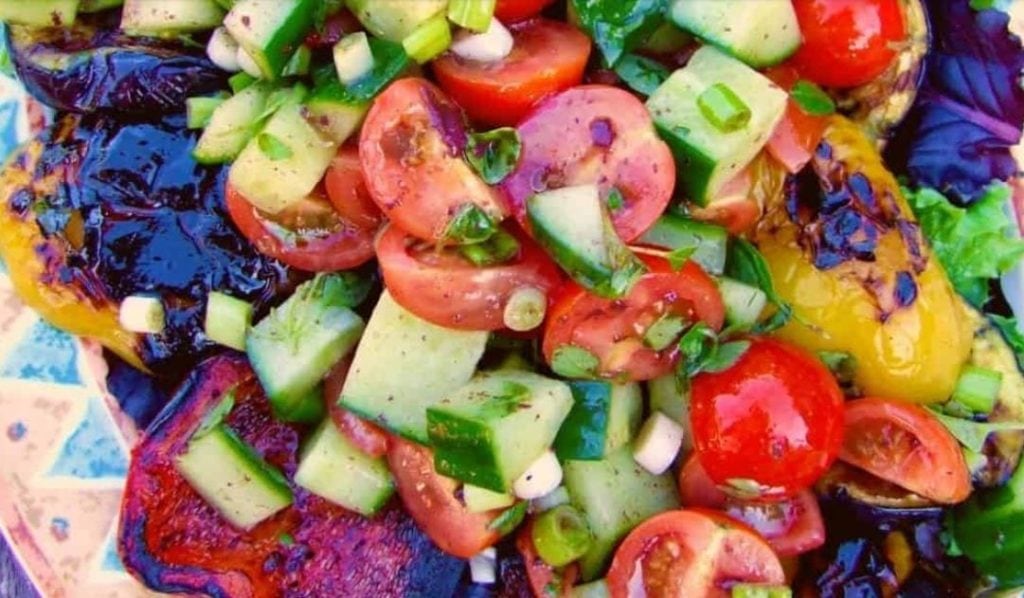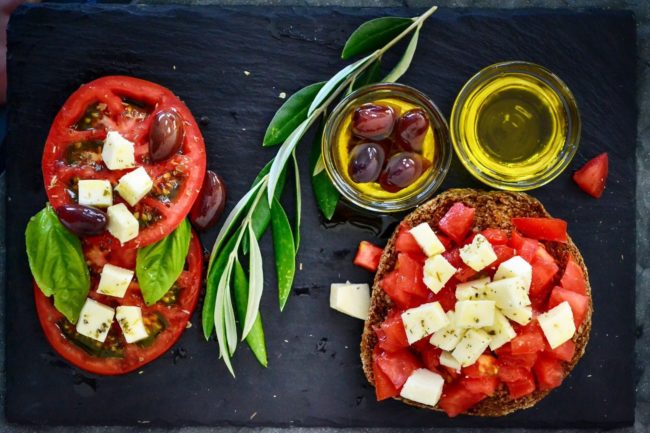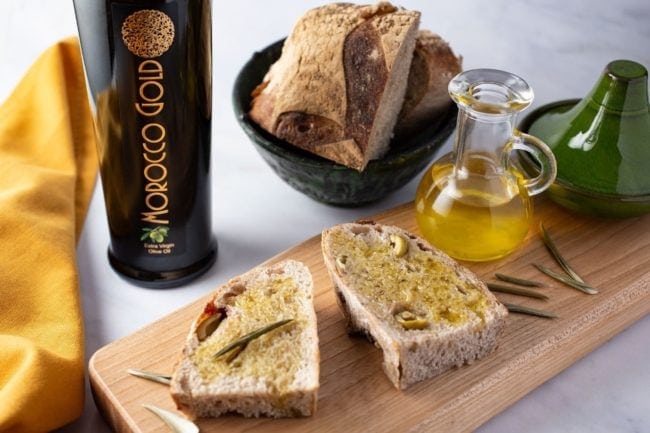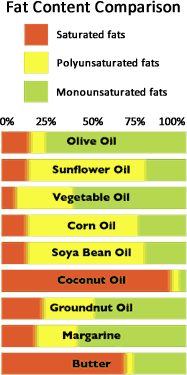Follow The Rules And Keep The Extra Virgin Olive Oil Flowing
Updated October 27th 2021

Adherence to the principles of The Mediterranean Diet is not a new trend. In fact, as popular diets go, it’s probably been top of the ‘A List’ for decades now. But how much do we know about the key elements of The Mediterranean Diet and how can Extra Virgin Olive Oil lovers make it second nature for us every day?
Here’s an Updated Cheat Sheet of the Most Important Mediterranean Diet Rules
What is A Mediterranean Diet?
The official NHS definition of A Mediterranean Diet is as follows :
A Mediterranean diet incorporates the traditional healthy living habits of people from countries bordering the Mediterranean Sea, including France, Greece, Italy and Spain.
What Foods are included in a Mediterranean Diet?
A Mediterranean diet is known for its emphasis on vegetables, fruits, legumes, nuts, beans, cereals, grains, fish and unsaturated fats such as extra virgin olive oil. It also usually includes a low intake of meat and dairy foods.

A Mediterranean diet is generally acknowledged to be one of the healthiest diets anyone can follow – and it’s a relatively easy one to switch to as you won’t be cutting out any food, you don’t need to have any in-depth knowledge of nutrition and you’ll get to try out lots of delicious new ingredients all at the same time.
All you really need to remember as an excellent rule of thumb is to eat less red meat and fewer sweets, introducing more wholegrains, legumes, fruit, nuts, vegetables, extra virgin olive oil and seafood into your diet instead. That’s it!
You can still eat dairy, poultry and eggs, but try to keep these to a moderate amount and try to follow more plant-based meal plans each week if you can.
The best olive oil you can find should form the main source of added fat in this kind of diet, providing you with monounsaturated fat, which has been proven to lower cholesterol. Nuts and seeds also contain strong levels of monounsaturated fat, so make sure you stock up on these as well.
To help get you started, aim for between seven and ten servings a day of fruit and veg. This sounds like a lot but you’ll soon get into the swing of it – and don’t forget that 150ml of pure unsweetened fruit juice counts as one of your five a day, as well.
Don’t give up bread, cereal and pasta – simply switch to wholegrain versions and look into the likes of bulgur wheat as an alternative to pasta and rice. And get to know your herbs and spices well, as you’ll be using these a lot to bring delicious flavours to your food.
The NHS also refers to its own ‘Eatwell’ guide as close to the principles of The Mediterranean Diet.
The Eatwell Guide guide shows what foods are needed for a healthy, balanced diet and how much you should eat of each food group:
- eat at least 5 portions of a variety of fruit and vegetables every day – find out more about getting your 5 A Day
- base your meals on starchy foods such as potatoes, bread, rice and pasta – choose wholegrain versions where possible
- eat some beans or pulses, fish, eggs, meat and other proteins (including 2 portions of fish every week, 1 of which should be oily)
- have some dairy or dairy alternatives (such as soya drinks) – choose lower-fat and lower-sugar options
- choose unsaturated oils and spreads, such as extra virgin olive oil and eat them in small amounts
- drink 6 to 8 glasses of fluid a day
- if consuming foods and drinks that are high in fat, salt or sugar, have them less often and in small amounts – find out more about reducing sugar in your diet
You do not need to achieve this balance with every meal, but try to get it right over the course of a day or even a week.
Extra Virgin Olive Oil and The Mediterranean Diet

Extra virgin olive oil is an integral part of the Mediterranean diet. A healthy diet that is associated with sensible tasty portions and slower, more enjoyable eating. People who eat a Mediterranean diet have been shown to have a remarkable variety of health benefits. The extra virgin olive oil in the Mediterranean diet can quickly satisfy hunger. It can lead to fewer total calories ingested at mealtime.
Extra virgin olive oil is one of the few oils that can be eaten without chemical processing. For instance, nearly every other vegetable oil has been detoxified and refined with steam and solvents. Fresh pressed extra virgin olive oil can be eaten immediately. It retains the natural flavours, vitamins, minerals, antioxidants, and other healthy products of the ripe olive fruit.
In 1958 Ancel Keys, a physiologist from the University of Minnesota School of Public Health observed that incidents of coronary heart disease were more common in middle-aged Americans. More than their European counterparts living in Mediterranean countries. He postulated that a correlation existed between people’s risk for heart disease and their eating habits and lifestyle. This observation led Keys to launch his seminal study. Participants from seven countries around the world – the United States, Italy, Greece, Yugoslavia, the Netherlands, Japan and Finland. After that, the hypothesis was tested.
Country Research
Consequent research showed a large discrepancy in the incidence and mortality of heart disease among the monitored populations. Participants from Italy and Greece, who had similar eating habits, had the lowest heart disease rates among other participants. The same was true for their Japanese counterparts, whose diet was also plant-based, but lacked the unsaturated fat that Mediterranean populations were receiving mainly from olive oil.
Participants from Finland and the United States, on the other hand, had the highest rates of heart disease due to their high intake of saturated animal fat, the research concluded. The Seven Countries Study demonstrated that low rates of heart disease can occur both with a low and a high intake of fat, depending on its nature and the dietary habits of the participants.
The revelation led to the formal definition of the Mediterranean diet in 1980. First published by Harvard University.
Harvard Medical School Food Pyramid

The Harvard Pyramid is based on the Mediterranean diet. Its structure came from the diets of the inhabitants of Crete and Southern Italy in the 1960’s. Presented in 1993 by Walter Willett of the Harvard School of Public Health at the International Conference on the Mediterranean Diet held in Cambridge Massachusetts. Note that olive oil is one of the basic components. This pyramid has enjoyed decades of increasing acceptance.
According to the Harvard Medical School Food Pyramid, the total amount of fat you eat, whether high or low, is not really linked with disease. Similarly, what really matters is the type of fat you eat. In other words, the “bad” fats, saturated and trans fats, increase the risk for certain diseases. Similarly, the “good” fats, mono-unsaturated, and poly-unsaturated fats like those contained in extra virgin olive oil lower disease risk. In conclusion, the key to a healthy diet is to substitute good fats for bad fats and to avoid trans fats.
Not All Fats are the Same
Fats are made up of fatty acids and glycerol. A fatty acid consists of a chain of carbon atoms, where each carbon atom in the chain is attached to hydrogen atoms. The number of hydrogen atoms per carbon atom determines whether the fatty acid is saturated or unsaturated.
Saturated Fats
If a fatty acid has all of the hydrogen atoms it can hold (2 per carbon atom in the chain) and all of the carbon atoms in the chain are linked by single bonds, it is described as saturated.
They are usually solid or semi-solid at room temperature and are strongly associated with raised blood cholesterol which is why nutritionists recommend eating them as little as possible. Lard, butter, hard cheeses, whole milk, animal fats and palm and coconut oils – plus products containing them – all contain high levels of saturated fat.
Monounsaturated Fats
If a pair of carbon atoms in the fatty acid chain is linked by a double bond instead of a single bond, the fatty acid is described as monounsaturated. Fats rich in monounsaturates tend to be liquid at room temperature. Olive Oil is one of the richest sources of monounsaturated fatty acids.
Monounsaturated fats—omega-6s in the case of olive oil—are important because they help boost heart health. This is important for helping prevent health issues such as cardiovascular disease or stroke.
Polyunsaturated Fats
These contain more than one double bond and are liquid at room temperature. The main sources are vegetable oils, such as sunflower oil, corn oil and rapeseed, but not tropical oils such as coconut, palm and palm kernel oils.
Trans Fats
Trans fats are created when a hydrogenation process is applied to solidify oil for use in margarines or to improve a product’s shelf life. This processing it to act like a saturated fats.
What Is In 1 Tablespoon Of Extra Virgin Olive Oil?
One serving or 1 tablespoon of extra-virgin olive oil contains the following:
- 120 calories
- 10 grams of monounsaturated fat
- 2 grams of saturated fat
- 2 grams of polyunsaturated fat
- 1.9 milligrams of vitamin E (10 percent of Daily Value)
- 8.1 micrograms of vitamin K (10 percent of DV)
The following illustrates the differing fat contents of a range of products.

Where can I find more recipe ideas to help follow The Mediterranean Diet?
Look no further than our very own website, which is packed with recipe ideas and tips to dial up the Mediterranean flavour in your kitchen!
